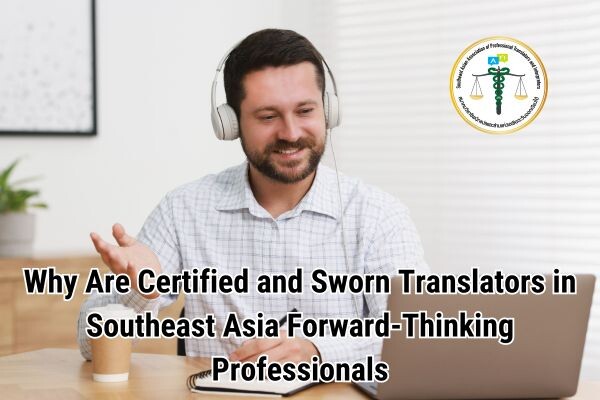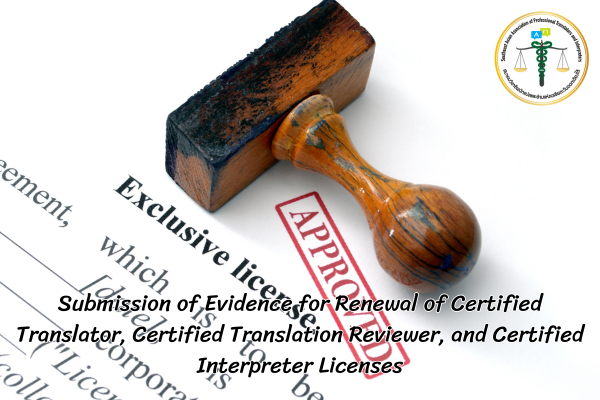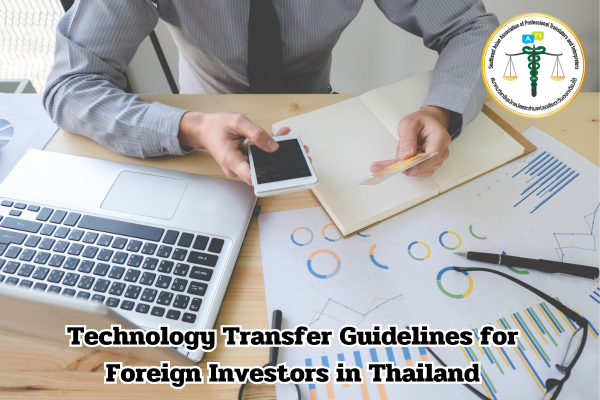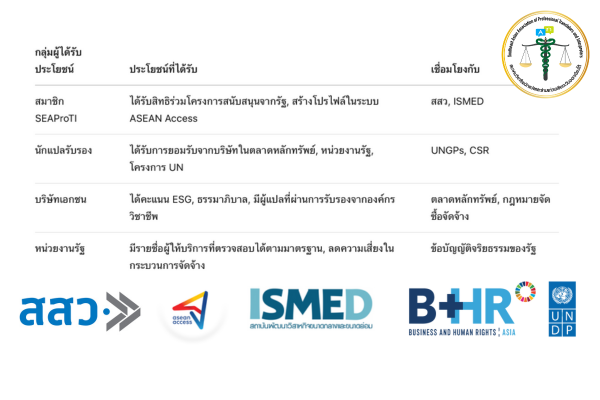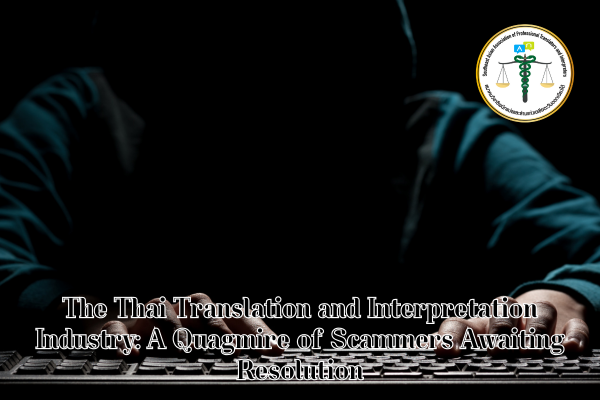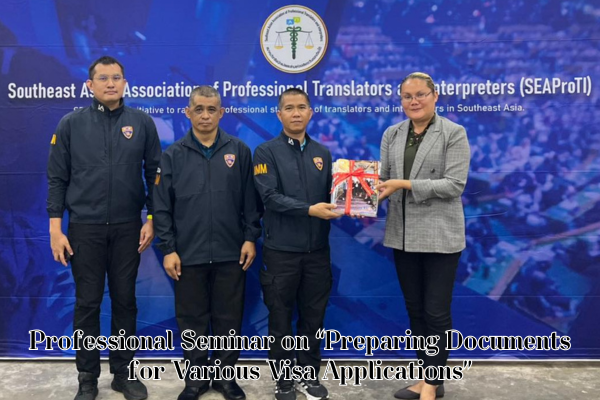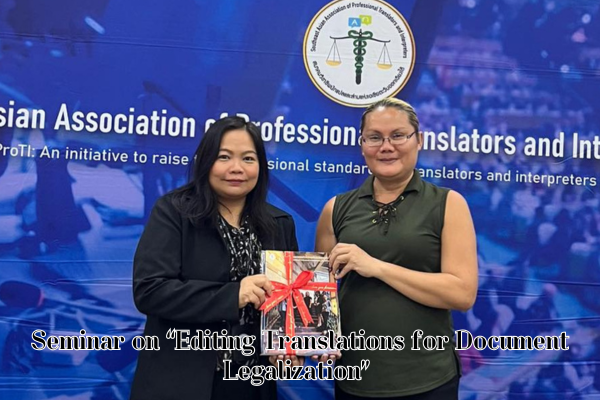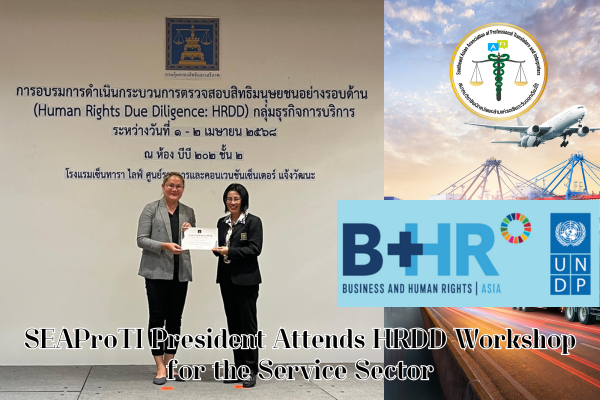Why Are Certified and Sworn Translators in Southeast Asia Forward-Thinking Professionals?
18 February 2025, Bangkok – Becoming a certified translator or sworn translator in Southeast Asia represents a significant step forward and reflects a broad, forward-thinking vision in several key areas:
1. Economic and Trade Growth in the Region
Southeast Asia is one of the fastest-growing economic regions. With free trade agreements and international cooperation frameworks such as the ASEAN Economic Community (AEC) and the RCEP agreement, the demand for translation and certified document services has surged, particularly in legal, business, investment, and education sectors.
🔹 Forward-Thinking Aspect → Certified translators gain access to a wider market, including government agencies and multinational corporations.
2. The Importance of Standards and Credibility in Translation
Government agencies, courts, lawyers, and international organizations require certified documents for legal purposes. Certification from professional bodies such as SEAProTI (Southeast Asian Association of Professional Translators and Interpreters) allows translators to take on high-trust assignments and distinguish themselves from uncertified translators.
🔹 Forward-Thinking Aspect → Certified translators gain a professional advantage and can command higher service fees.
3. Alignment with International Standards
Many countries require translators to be certified by recognized institutions such as NAATI (Australia), ATA (USA), NRPSI (UK), AIIC (for interpreters). Certification in Southeast Asia helps translators expand their career opportunities internationally.
🔹 Forward-Thinking Aspect → Preparing for global standards enables certified translators to work across multiple countries and collaborate with international organizations.
4. Growing Demand for Translators in the Justice System
With the rise of cross-border legal cases, including migrant labor disputes and human trafficking cases, Sworn Translators and Court Interpreters are becoming more critical. Certified translators can handle legal documents such as contracts, court rulings, and rights protection documents.
🔹 Forward-Thinking Aspect → Certification in legal translation opens opportunities to work with the judicial system and human rights organizations.
5. Technology Is Transforming the Translation Industry
While AI and machine translation (MT) are advancing, certified translations still require human expertise for accuracy and legal accountability—something automated tools cannot fully provide.
🔹 Forward-Thinking Aspect → Certified translators who specialize in legal, medical, and technical translation will remain relevant and stay ahead of industry changes.
6. Access to High-Level Career Opportunities
Certified translators often handle high-stakes assignments, including government-certified documents, legal contracts, and international negotiations.
🔹 Forward-Thinking Aspect → Certified translators can enter high-paying markets and gain access to prestigious and challenging projects.
Conclusion: Forward-Thinking = Investing in the Future
Certified and sworn translators in Southeast Asia are forward-thinking professionals because they invest in their expertise and credentials to enhance their career prospects, expand their market, and secure their professional future. In an era where translation demands both expertise and high standards, certification is a strategic move.
📌 Key Takeaway
If you want to grow in the translation industry, getting certified is one of the best ways to reach the next level and establish a stable, rewarding career. 💡
SEAProTI’s certified translators, translation certification providers, and certified interpreters:
The Southeast Asian Association of Professional Translators and Interpreters (SEAProTI) has officially announced the criteria and qualifications for individuals to register as “Certified Translators,” “Translation Certification Providers,” and “Certified Interpreters” under the association’s regulations. These guidelines are detailed in Sections 9 and 10 of the Royal Thai Government Gazette, issued by the Secretariat of the Cabinet under the Office of the Prime Minister of the Kingdom of Thailand, dated July 25, 2024, Volume 141, Part 66 Ng, Page 100.
To read the full publication, visit: the Royal Thai Government Gazette
ทำไมนักแปลรับรองและนักแปลสาบานตนในเอเชียตะวันออกเฉียงใต้เป็นผู้ที่มองการณ์ไกล?
18 กุมภาพันธ์ 2568, กรุงเทพมหานคร – การเป็น นักแปลรับรอง (Certified Translator) และ นักแปลสาบานตน (Sworn Translator) ในเอเชียตะวันออกเฉียงใต้ถือเป็นการก้าวล้ำไปข้างหน้าและสะท้อนถึงวิสัยทัศน์ที่กว้างไกลในหลายมิติ ดังนี้:
1. การเติบโตของเศรษฐกิจและการค้าในภูมิภาค
เอเชียตะวันออกเฉียงใต้เป็นหนึ่งในภูมิภาคที่เศรษฐกิจกำลังเติบโตอย่างรวดเร็ว ด้วยการค้าเสรีและความร่วมมือระดับนานาชาติ เช่น ASEAN Economic Community (AEC) และข้อตกลง RCEP ทำให้ความต้องการบริการแปลและรับรองเอกสารเพิ่มขึ้นอย่างมาก ไม่ว่าจะเป็นด้านกฎหมาย ธุรกิจ การลงทุน และการศึกษาต่อ
🔹 มองการณ์ไกล → ผู้ที่ได้รับการรับรองจะมีโอกาสขยายตลาดและเข้าถึงลูกค้าระดับองค์กรขนาดใหญ่ ทั้งภาครัฐและเอกชน
2. ความสำคัญของมาตรฐานและความน่าเชื่อถือในงานแปล
หน่วยงานราชการ ศาล ทนายความ และองค์กรระดับนานาชาติต้องการเอกสารที่ได้รับการรับรองเพื่อใช้เป็นหลักฐานทางกฎหมาย การได้รับการรับรองจากองค์กรวิชาชีพ เช่น Southeast Asian Association of Professional Translators and Interpreters (SEAProTI) ทำให้สามารถรับงานที่ต้องใช้ความน่าเชื่อถือสูง และลดการแข่งขันจากนักแปลทั่วไปที่ไม่มีใบรับรอง
🔹 มองการณ์ไกล → นักแปลที่ได้รับการรับรองจะมี ความได้เปรียบทางวิชาชีพ และสามารถคิดค่าบริการที่สูงขึ้นได้
3. การเชื่อมต่อกับมาตรฐานสากล
ปัจจุบันหลายประเทศกำหนดให้นักแปลต้องมีใบรับรองที่ได้รับการยอมรับในระดับนานาชาติ เช่น NAATI (ออสเตรเลีย), ATA (สหรัฐฯ), NRPSI (สหราชอาณาจักร), AIIC (สำหรับล่าม) การได้รับการรับรองในเอเชียตะวันออกเฉียงใต้ทำให้นักแปลสามารถ ขยายขอบเขตการทำงานสู่ระดับสากล ได้ง่ายขึ้น
🔹 มองการณ์ไกล → การเตรียมพร้อมเพื่อรองรับมาตรฐานระดับโลก จะช่วยให้สามารถทำงานในหลายประเทศ และมีโอกาสร่วมงานกับองค์กรระหว่างประเทศ
4. ความต้องการนักแปลและล่ามในกระบวนการยุติธรรม
การขยายตัวของคดีข้ามพรมแดน รวมถึงคดีแรงงานข้ามชาติและการค้ามนุษย์ ทำให้ นักแปลสาบานตน (Sworn Translator) และ ล่ามศาล (Court Interpreter) มีบทบาทสำคัญขึ้นเรื่อย ๆ นักแปลที่ผ่านการรับรองสามารถทำงานด้านกฎหมาย เช่น การรับรองเอกสารทางกฎหมาย สัญญาธุรกิจ คำพิพากษา และงานที่เกี่ยวข้องกับสิทธิของผู้ต้องหาและพยานในศาล
🔹 มองการณ์ไกล → การได้รับการรับรองในงานแปลด้านกฎหมายช่วยให้สามารถร่วมงานกับหน่วยงานยุติธรรม และองค์กรด้านสิทธิมนุษยชน
5. เทคโนโลยีกำลังเปลี่ยนแปลงอุตสาหกรรมแปล
แม้ว่า AI และ Machine Translation (MT) จะเข้ามามีบทบาท แต่การรับรองเอกสารยังต้องการความถูกต้องและความรับผิดชอบทางกฎหมาย ซึ่งเครื่องมืออัตโนมัติไม่สามารถทำแทนมนุษย์ได้
🔹 มองการณ์ไกล → นักแปลรับรองที่พัฒนา ทักษะเฉพาะทาง เช่น งานแปลทางกฎหมาย งานแปลด้านสุขภาพ งานแปลด้านเทคนิค จะสามารถอยู่รอดและก้าวนำหน้าการเปลี่ยนแปลงของอุตสาหกรรม
6. โอกาสในการทำงานระดับสูง
นักแปลที่ได้รับการรับรองมักได้รับความไว้วางใจให้ทำงานที่มี ความสำคัญสูง เช่น การรับรองเอกสารราชการ การแปลสัญญาทางธุรกิจ และการทำงานร่วมกับหน่วยงานระหว่างประเทศ
🔹 มองการณ์ไกล → ผู้ที่ได้รับการรับรองสามารถเข้าสู่ตลาดงานที่ ค่าตอบแทนสูงขึ้น และได้รับโอกาสในการทำงานที่ท้าทายและมีเกียรติ
สรุป: มองการณ์ไกล = การลงทุนในอนาคต
นักแปลรับรองและนักแปลสาบานตนในเอเชียตะวันออกเฉียงใต้เป็นผู้ที่มองการณ์ไกล เพราะพวกเขา ลงทุนในคุณค่าและความสามารถของตนเอง เพื่อเพิ่มโอกาสในการทำงาน ขยายตลาด และรับรองความมั่นคงในอาชีพ ในยุคที่การแปลต้องอาศัยทั้งความเชี่ยวชาญและมาตรฐานระดับสูง
📌 ข้อคิดสำคัญ
หากคุณต้องการเติบโตในสายงานแปล การได้รับการรับรองคือหนึ่งในวิธีที่ดีที่สุด ในการก้าวสู่ระดับที่สูงขึ้นและสร้างอนาคตที่มั่นคงในอาชีพนี้ 💡
เกี่ยวกับนักแปลรับรอง ผู้รับรองการแปล และล่ามรับรองของสมาคมวิชาชีพนักแปลและล่ามแห่งเอเชียตะวันออกเฉียงใต้
สมาคมวิชาชีพนักแปลและล่ามแห่งเอเชียตะวันออกเฉียงใต้ (SEAProTI) ได้ประกาศหลักเกณฑ์และคุณสมบัติผู้ที่ขึ้นทะเบียนเป็น “นักแปลรับรอง (Certified Translators) และผู้รับรองการแปล (Translation Certification Providers) และล่ามรับรอง (Certified Interpreters)” ของสมาคม หมวดที่ 9 และหมวดที่ 10 ในราชกิจจานุเบกษา ของสำนักเลขาธิการคณะรัฐมนตรี ในสำนักนายกรัฐมนตรี แห่งราชอาณาจักรไทย ลงวันที่ 25 ก.ค. 2567 เล่มที่ 141 ตอนที่ 66 ง หน้า 100 อ่านฉบับเต็มได้ที่: นักแปลรับรอง ผู้รับรองการแปล และล่ามรับรอง


